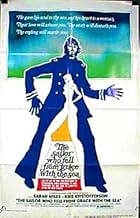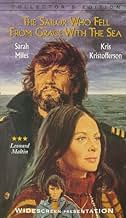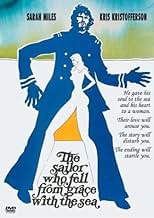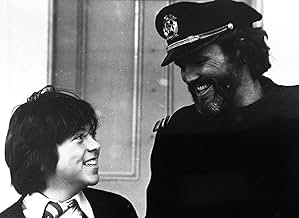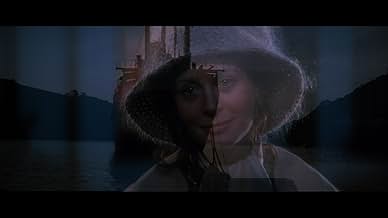Le marin qui abandonna la mer
Titre original : The Sailor Who Fell from Grace with the Sea
ÉVALUATION IMDb
6,2/10
1,8 k
MA NOTE
Ajouter une intrigue dans votre langueAfter his father dies, a disturbed young boy plots to take revenge on the new man in his mother's life.After his father dies, a disturbed young boy plots to take revenge on the new man in his mother's life.After his father dies, a disturbed young boy plots to take revenge on the new man in his mother's life.
- Director
- Writers
- Stars
- Prix
- 2 nominations au total
Charles Adey-Grey
- Man in Tea Room
- (uncredited)
Mabel Etherington
- Woman in Tea Room
- (uncredited)
Juba Kennerley
- Man in Tea Room
- (uncredited)
Avis en vedette
An unforgettable and profoundly disturbing story centered on a widow, Anne, and her only son, Jonathan, in a remote English seaside town. Jonathan belongs to a gang led by a precociously intelligent sociopath known only as Chief, who through sheer force of will and intellect, indoctrinates them with a quasi-Neitzchean philosophy of ultimate superiority and the non-existence of morality. When Kris Kristofferson's Captain Jim arrives in town, and strikes up a passionate relationship with the lonely Anne, Jonathan sees him as a heroic masculine prototype, removed from society and living a 'true' life on the open sea. But when the Captain decides to settle down and marry Anne, Jonathan takes it as an ultimate and unforgivable betrayal, and exacts a terrible revenge.
Based on the 1963 Mishima novel, "The Sailor Who Fell From Grace With The Sea" hints at many themes, from Jonathan's Oedipal obsession with spying on his mother's bedroom to his physical admiration of the Captain that verges on latent homosexuality. The atmosphere, masterfully created by veteran cinematographer Douglas Slocombe, is one of darkly brooding clouds, gray seas, and an air that constantly threatens rain. The (in)famous sex scenes are really not that explicit, and the casual violence exhibited by the children is far more shocking than any glimpse of breast or buttock.
The film, for all its brilliantly evocative atmosphere, excellent performances, and quietly brooding menace, is not without its flaws. The score is terrible, all mawkish piano and sickly clarinet. It is often overly intrusive and distracts from the overall sense of ripe stillness that director Carlino conjures throughout the film. But in general, the film is a remarkable experience, and one that any viewer is unlikely to forget quickly.
Based on the 1963 Mishima novel, "The Sailor Who Fell From Grace With The Sea" hints at many themes, from Jonathan's Oedipal obsession with spying on his mother's bedroom to his physical admiration of the Captain that verges on latent homosexuality. The atmosphere, masterfully created by veteran cinematographer Douglas Slocombe, is one of darkly brooding clouds, gray seas, and an air that constantly threatens rain. The (in)famous sex scenes are really not that explicit, and the casual violence exhibited by the children is far more shocking than any glimpse of breast or buttock.
The film, for all its brilliantly evocative atmosphere, excellent performances, and quietly brooding menace, is not without its flaws. The score is terrible, all mawkish piano and sickly clarinet. It is often overly intrusive and distracts from the overall sense of ripe stillness that director Carlino conjures throughout the film. But in general, the film is a remarkable experience, and one that any viewer is unlikely to forget quickly.
Though I never read the Japanese book from which this movie is based - I thought the comments of other posters missed a salient point in their reviews.
No one brought up the exploration of the focus on the "pure and perfect" order of things that is a backdrop for the exploration of the boys in the film. I'm assuming that that refers to the idea that there is such a thing and that when we deviate from it - meaning is somehow bastardized - and focus and purpose are lost. Unfortunately, when - during exploration - one destroys the object of one's investigation that too seems a bastardization of the "pure and perfect order."
A disturbing film but I do like Kris Kristofferson and he did write the music for the soundtrack which is beautiful. I tried many times to find a CD of the soundtrack but the movie has been out of print for so long that it is probably not possible to find one.
No one brought up the exploration of the focus on the "pure and perfect" order of things that is a backdrop for the exploration of the boys in the film. I'm assuming that that refers to the idea that there is such a thing and that when we deviate from it - meaning is somehow bastardized - and focus and purpose are lost. Unfortunately, when - during exploration - one destroys the object of one's investigation that too seems a bastardization of the "pure and perfect order."
A disturbing film but I do like Kris Kristofferson and he did write the music for the soundtrack which is beautiful. I tried many times to find a CD of the soundtrack but the movie has been out of print for so long that it is probably not possible to find one.
It's a compelling, morbid film most of the time - but what's up with the ending? It builds up (competently and suspensefully) to a situation that can easily be guessed right from the beginning, and then....it just stops, as if being afraid of going "too far". Perhaps the novel ends the same way, but in this movie it doesn't work - it renders the whole film pointless. The hyped-up erotic scenes are brief and too darkly photographed, but the performances are right on target. (**1/2)
This is a British drama from 1976 about a shy and lonely widow Anne (Sarah Miles) raising up her 13-year-old son in a small English seaside city. When she meets the American sailor Jim (Kris Kristofferson), she falls in love with him and wants to marry him. Her son, being a member of a fascist secret circle led by the charismatic pupil "Chief", doesn't agree with that liaison and uses his radical friends against his possible stepfather...
The German title of this brilliant movie was called "Der Weg allen Fleisches" which means as much as "The way of all flesh". This is a suitable title as love, loneliness, seduction, longings and sex are integral elements of the story.
The director uses surreal scenes to support the emotional side of the movie. There is a beautifully shot sex scenes between Anne and Jim, and an outstanding masturbation scene of Anne in front of a mirror, secretly watched by her son. There are strange dream sequences, spiritual moods of the sea and a cruel scene where the gang's leader rips off a dead cat to present his totalitarian theories to his worshippers by its testicles.
Sarah Miles ("Blow-up", "Venom"), Kris Kristofferson ("Pat Garrett and Billy the Kid", "Convoy") and also the children actors are doing a fine job here. The touching score was written by Johnny Mandel, and Kris Kristofferson added his chilling "Sea Dream Theme". This film is more than just a love drama but an outstanding and forgotten tale about love, sex and death at the seaside with great locations and a very strange ending. Watch it if you get the occasion to do so!
The German title of this brilliant movie was called "Der Weg allen Fleisches" which means as much as "The way of all flesh". This is a suitable title as love, loneliness, seduction, longings and sex are integral elements of the story.
The director uses surreal scenes to support the emotional side of the movie. There is a beautifully shot sex scenes between Anne and Jim, and an outstanding masturbation scene of Anne in front of a mirror, secretly watched by her son. There are strange dream sequences, spiritual moods of the sea and a cruel scene where the gang's leader rips off a dead cat to present his totalitarian theories to his worshippers by its testicles.
Sarah Miles ("Blow-up", "Venom"), Kris Kristofferson ("Pat Garrett and Billy the Kid", "Convoy") and also the children actors are doing a fine job here. The touching score was written by Johnny Mandel, and Kris Kristofferson added his chilling "Sea Dream Theme". This film is more than just a love drama but an outstanding and forgotten tale about love, sex and death at the seaside with great locations and a very strange ending. Watch it if you get the occasion to do so!
I really enjoyed this movie back when it came out in 1976. It never showed up at the major theaters though. I saw it in one of the Dollar theaters. How it got away with an R rating back then I will never know. I had seen x-rated movies that had showed less. And the love scenes were a spread in Playboy. My girlfriend said is was because it had a plot. I do remember she was in a state of shock when we left. She was an 18 year old Southern Bapist Sunday School teacher at the time. Kris Kristofferson was never highly rated as an Actor but I think he did an excellent job in this movie. The child actors were completely believable. It was written by a Japanese gentleman and I am amazed at how well some examples of Japanese literature and movies translate to the US. The Magificent Seven ( AKA the Seven Samarai) and " A fistful of Dollars".
If you can find it on DVD I would highly recommend it.
If you can find it on DVD I would highly recommend it.
Le saviez-vous
- AnecdotesFirst English language filmed adaptation of a novel by Japanese writer Yukio Mishima.
- Autres versionsUS DVD version is cut. Sex scenes of Sarah Miles are tamed down in US version.
- ConnexionsReferenced in Fantasm Comes Again (1977)
Meilleurs choix
Connectez-vous pour évaluer et surveiller les recommandations personnalisées
- How long is The Sailor Who Fell from Grace with the Sea?Propulsé par Alexa
Détails
- Date de sortie
- Pays d’origine
- Langue
- Aussi connu sous le nom de
- The Sailor Who Fell from Grace with the Sea
- Lieux de tournage
- sociétés de production
- Consultez plus de crédits d'entreprise sur IMDbPro
Contribuer à cette page
Suggérer une modification ou ajouter du contenu manquant


